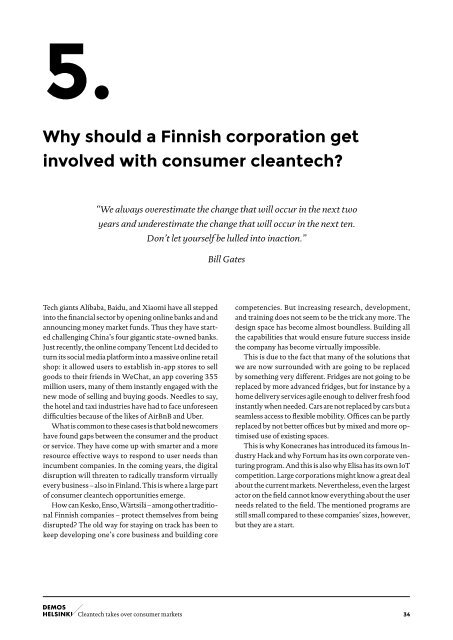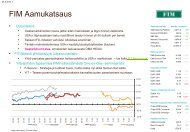Cleantech takes over consumer markets
Consumer_Cleantech_Report1
Consumer_Cleantech_Report1
- No tags were found...
Create successful ePaper yourself
Turn your PDF publications into a flip-book with our unique Google optimized e-Paper software.
5.<br />
Why should a Finnish corporation get<br />
involved with <strong>consumer</strong> cleantech?<br />
“We always <strong>over</strong>estimate the change that will occur in the next two<br />
years and underestimate the change that will occur in the next ten.<br />
Don’t let yourself be lulled into inaction.”<br />
Bill Gates<br />
Tech giants Alibaba, Baidu, and Xiaomi have all stepped<br />
into the financial sector by opening online banks and and<br />
announcing money market funds. Thus they have started<br />
challenging China’s four gigantic state-owned banks.<br />
Just recently, the online company Tencent Ltd decided to<br />
turn its social media platform into a massive online retail<br />
shop: it allowed users to establish in-app stores to sell<br />
goods to their friends in WeChat, an app c<strong>over</strong>ing 355<br />
million users, many of them instantly engaged with the<br />
new mode of selling and buying goods. Needles to say,<br />
the hotel and taxi industries have had to face unforeseen<br />
difficulties because of the likes of AirBnB and Uber.<br />
What is common to these cases is that bold newcomers<br />
have found gaps between the <strong>consumer</strong> and the product<br />
or service. They have come up with smarter and a more<br />
resource effective ways to respond to user needs than<br />
incumbent companies. In the coming years, the digital<br />
disruption will threaten to radically transform virtually<br />
every business – also in Finland. This is where a large part<br />
of <strong>consumer</strong> cleantech opportunities emerge.<br />
How can Kesko, Enso, Wärtsilä – among other traditional<br />
Finnish companies – protect themselves from being<br />
disrupted? The old way for staying on track has been to<br />
keep developing one’s core business and building core<br />
competencies. But increasing research, development,<br />
and training does not seem to be the trick any more. The<br />
design space has become almost boundless. Building all<br />
the capabilities that would ensure future success inside<br />
the company has become virtually impossible.<br />
This is due to the fact that many of the solutions that<br />
we are now surrounded with are going to be replaced<br />
by something very different. Fridges are not going to be<br />
replaced by more advanced fridges, but for instance by a<br />
home delivery services agile enough to deliver fresh food<br />
instantly when needed. Cars are not replaced by cars but a<br />
seamless access to flexible mobility. Offices can be partly<br />
replaced by not better offices but by mixed and more optimised<br />
use of existing spaces.<br />
This is why Konecranes has introduced its famous Industry<br />
Hack and why Fortum has its own corporate venturing<br />
program. And this is also why Elisa has its own IoT<br />
competition. Large corporations might know a great deal<br />
about the current <strong>markets</strong>. Nevertheless, even the largest<br />
actor on the field cannot know everything about the user<br />
needs related to the field. The mentioned programs are<br />
still small compared to these companies’ sizes, however,<br />
but they are a start.<br />
<strong>Cleantech</strong> <strong>takes</strong> <strong>over</strong> <strong>consumer</strong> <strong>markets</strong><br />
34






